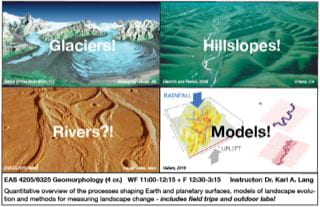EAS 4205/6325 Geomorphology

EAS 4205/6325 Geomorphology

For graduate and undergraduate students who are interested in taking a 3-credit Special Research Problem in Summer 2022 or Fall 2022 on the topic of “Sustainable Safety and Mobility for Seniors”, please reach out to Prof. James Tsai (james.tsai@ce.gatech.edu) with your CV and also cc graudate research assistant (GRA), Tahmid Samiul Mowla (tmowla6@gatech.edu). Note that these 3 credits of special research problem can be counted towards your graduation. Interested students must have a strong passion on safety and mobility for aging population.
Special Research Problem Overview
A major shift in demographics is expected in the next few years in US. Research interests and increasing funds are being allocated to finding sustainable solutions to address challenges of growing old while maintaining the same level of independence and mobility in the community. The population older than 65 is projected to double and are projected to be over 88 million people in the US by the year 20501. Seniors are a vulnerable subgroup in the transportation system due to limited physical and mental capabilities including muscular, visual, hearing, and cognitive impairments or disabilities. To promote appropriate mental and physical health for an aging population and prevent seniors from being stuck in their homes, resulting in social isolation, interdisciplinary research must be undertaken to ensure safe and accessible transportation services are available. Seniors are a non-homogeneous group whose travelling environment includes walking, driving, or using mobility services, inside and outside their communities. It is necessary to assess optimal mode choices for seniors who have various health conditions, income levels, and geographic locations. Some seniors prefer to drive while others may not be capable of driving or even walking extended distance to transit stops.
“Aging” is one of the seven challenges listed in Georgia Tech’s Research Next that will profoundly influence the research university environment. Additionally, this research fits into at least 4 out of 17 of the United Nations Sustainable Development Goals (SDGs). These goals 1) good health and well-being, 2) industry, innovation, and infrastructure, 3) reduced inequality, and 4) sustainable cities and communities. To address safe mobility for an aging population holistically, it is vital to explore this challenge from multiple perspectives. These perspectives include: 1) transportation planning 2) safe engineering design, 3) design of services for age related disabilities, 4) public health, 5) psychology, 6) assistive technology and universal design, 7) infrastructure asset management, 8) logistics, and 9) policy. These perspectives are to ensure that transportation for seniors is safe, accessible, equitable, affordable, and therefore sustainable.
Comprehensive performance matrices will be developed to characterize the senior friendliness of roadway segment, mode of transportation, or living space. These performance matrices will assess the safety, affordability, equity, and condition of transportation facilities. The matrices will also account for various modes of transportation that are available to people of different ages and with various health conditions. Other considerations in this matrix will be aging in community (AIC). AIC is a growing trend that considers where seniors can buy goods, socialize, connect to nature, and be close to family.
The research will include 1) interviews of senior centers and the aging population to get insight understanding of senior’s challenges and transportation needs, 2) review and refinement of comprehensive performance metrics of safe mobility for aging population, 3) development of the roadmap for a sustainable safety and mobility of aging population, and 4) creation of research need statements for improving the safety and mobility of our aging population.
Dear CEE community,
Happy new year! May 2022 bring you everything that you wish for and beyond.
As the Spring semester is approaching, I would like to bring your attention to a new seminar-based course entitled “Diversity, Equity and Inclusion in Civil and Environmental Engineering,” which will be offered in Spring 2022. The course is open to undergraduate students, but interested graduate students are invited to sign up for a special problem (CEE 8900) with me. We will alternate talks with roundtables. The talks will be remote and open to the whole CEE community. The roundtables between the talks will be reserved to students enrolled in the class. We will be meeting as a cohort every Wednesday 5pm-6pm. The syllabus is attached, and here is the schedule of the talks:
01/19: “LGBTQ+ (in)visibility in engineering”, Dr. Michael Falk, Johns Hopkins University
01/26: “Transportation: a means to enhance or alleviate discrimination”, Jacob Tzegaegbe, Expansion at Via
02/09: “How environmental justice changed after the Flint catastrophe”, Dr. Lindsey Butler, Blue Cross Blue Shield of Massachusetts
02/23: “Gender equity in energy access”, Dr. Paulina Jaramillo, Carnegie Mellon University
03/09: “Accessibility to urban infrastructure for physically disabled persons”, Maria Sotnikova, Atlanta Regional Commission
03/30: “Assessing and improving climate on engineering campuses: UCLA case study”, Dr. Scott Brandenberg, University of California in Los Angeles
04/13: “Diversity and inclusion in civil and environmental consulting”, Bing Zhang, Kimley – Horn
The scope of the course and a detailed syllabus for the writing assignments will be discussed during the first lecture (on 01/12). Please email me if you have any question. Very much looking forward to seeing you in the DEI in CEE forum!
Best regards,
Chloé Arson

